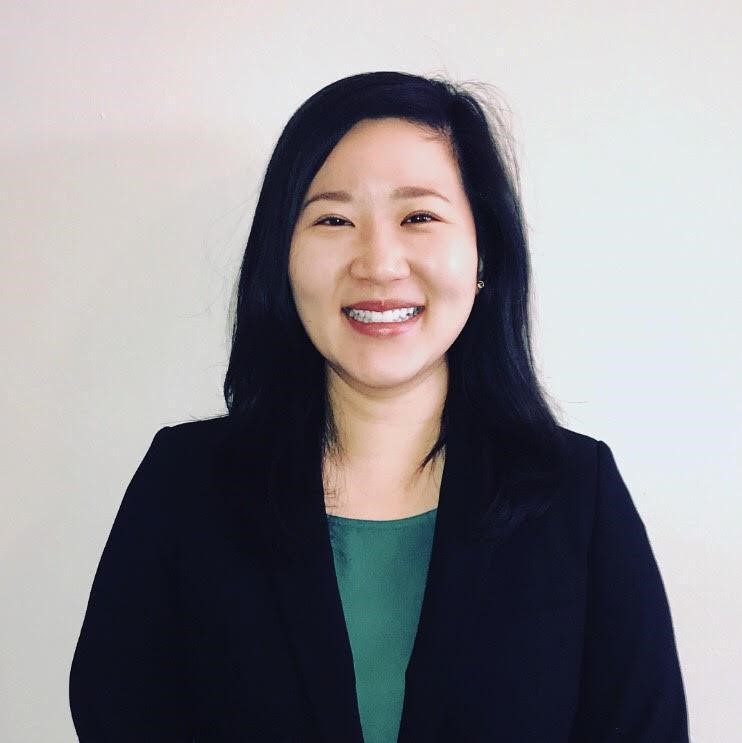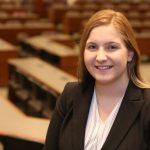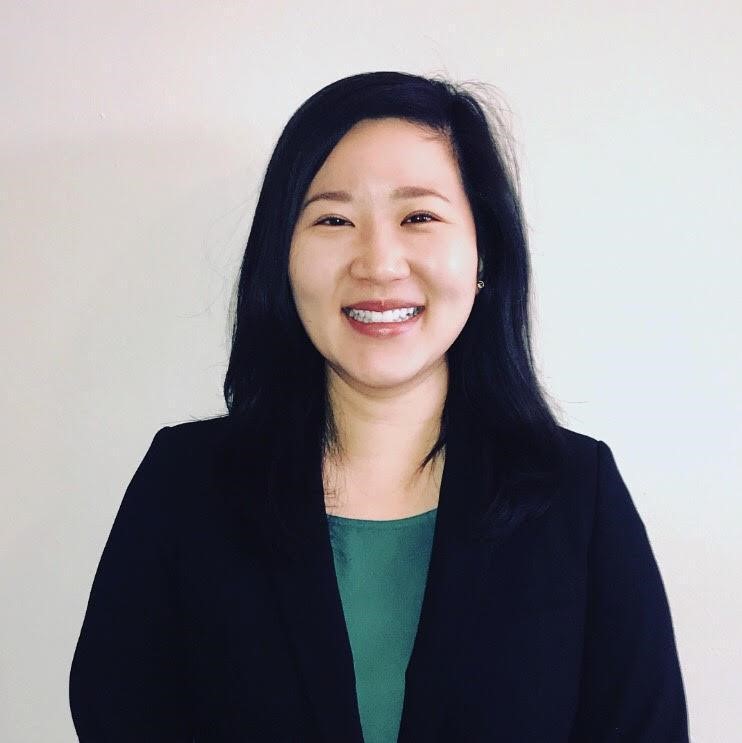
Carrie Park is a second-year law student at Loyola University Chicago School of Law with interests in patent and health law. She earned her Doctor of Pharmacy from Midwestern University Chicago College of Pharmacy in 2016 and went on to work as a pharmacist before coming to law school to pursue a career at the intersection of health, pharmacy, and patent law. She is an associate blogger for IP Bytes, serves on the executive boards for IP Law Society and Health Law Society, is a Legal Writing tutor, and is a member of the Annals of Health Law and Life Sciences journal.
What brought you to law school and what made you decide on Loyola?
During my second year of pharmacy school, I took a course where my professor, who is also an inventor working in conjunction with pharmaceutical companies, focused on the R&D process and highlighted the importance of patents. He became my mentor. I also got to know his patent and health lawyer colleagues through guest lectures. Through these relationships, I was introduced to how the world of patents ties into pharmaceuticals, which spurred my interest in fusing the two together by pursuing a career in law after finishing pharmacy school.
When it came to choosing a law school, I sought to find a school whose culture and values reflect mine. While attending one of Loyola’s admitted student days, I met many upperclassmen, faculty, and administration. Experiencing a day in the life of a Loyola law student provided me with a strong sense of the culture and close-knit community. I knew that not only would I receive a great legal education here, but I could grow as an individual and future advocate.
I also got a chance to meet some of the professors very early on in my law school career. For instance, even before I was a student, the faculty and administration at the Beazley Institute were always willing to answer questions and spend time getting to know me as an individual. I am also grateful for Professor Ho. She is always willing to meet with students and prioritizes providing opportunities for students’ growth and success, whether it is through one-on-one meetings to discuss course recommendations or through providing networking opportunities in the Chicagoland IP community. Overall, Loyola felt like a very welcoming, encouraging place with great people and resources.
Given your path to law school, were you always certain you would do IP and patent law in particular? Or did you ever consider any other fields?
I knew I wanted to pursue either health law or IP law because of my interest in integrating my pharmacy background with a legal career. Taking more classes pertaining to IP, especially this semester with Patent Litigation and last semester with IP Survey, solidified my interest in pursuing IP in the pharmaceutical industry.
Coming from a science background, did you have any apprehension about going to law school?
My biggest fear was being cold-called (i.e. when a professor calls on an individual without warning during class). I know it sounds so trivial now, but coming from a science background, I was used to hearing the professor lecture and then digesting material on my own time afterward.
During my first semester, I worked to get comfortable with sharing my thoughts out loud, whether they were right or wrong, and to be confident in myself. I understand now that cold-calling is important because it encourages you to articulate your thoughts coherently, and shapes you to become the best advocate for your clients.
Have you had any classes that you particularly enjoyed or would recommend (IP or otherwise)?
My favorite class from my first year was Constitutional Law, taught by Professor Sullivan. Of course, all of our classes are important, but Constitutional Law is so intriguing because not only is its historical context rich, but it is applicable toevery aspect of law, and affects everyone.
I also enjoyed our IP Survey course this past fall. It provided me with a solid background on all types of IP (patents, copyrights, and trademarks). I especially liked preparing and presenting our final project at the end of the semester. For that project, students paired up to present analyses of real, or concocted scenarios pertaining to patent, trademark, and copyright issues. The project was a fun, interactive way we reviewed and affirmed the knowledge we gained that semester.
What was your 1L summer experience like? What did you like most about it?
I loved my 1L summer experience! I worked for AbbVie’s in-house IP counsel, specifically in their patent department. About half of their group are patent prosecutors (those who try to obtain patents) and half are patent litigators. As interns, we were paired with mentors who provided us with substantive prosecution and litigation assignments. When I worked with patent prosecutors, I learned the process behind how patents are created and got hands-on experience drafting patent applications. I also drafted responses to U.S. and foreign “office actions,” where the patent office typically suggests a problem with patentability, which I then needed to rebut. I also conducted a “Freedom to Operate” analysis to determine what AbbVie could safely do without violating a patent. On the patent litigation side, I provided input during meetings with outside legal counsel, communicated with experts, and performed a patent infringement analysis. Working in-house provided me with a unique perspective on understanding what clients want and need, how corporations think, and how these relate to the law.
Are you working now? Or do you know what you’ll be doing this upcoming summer?
I don’t currently work in a legal capacity, but I am working as a pharmacist. I’m excited for this summer when I’ll be working for Venable in their New York office with their intellectual property team.
Given your interest in patent law, are you planning on taking the patent “bar”?
I’m preparing for the patent bar right now. The patent bar is totally unrelated to state bar exams and does not require law school classes, but is necessary for people who want to represent inventors before the US Patent and Trademark Office as patent prosecutors. I’m planning on taking the exam by this upcoming fall semester.
Do you have any advice for non-science students who are interested in IP?
I give tours for prospective students and something I always tell people who may be interested in IP but don’t have a science background is that it is not necessary for IP litigation. For instance, nothing will keep you from being a great patent litigator just because you don’t have that science background. Many accomplished patent litigators don’t have one. Attorneys with non-science backgrounds can even use that to their advantage by explaining technology in understandable and relatable terms to the jurors, who also likely do not have a science background. So, you can definitely pursue IP litigation without a science degree.
What have been some of the best opportunities you’ve had at Loyola?
I’ve enjoyed attending “speed networking” events where we got to go around to tables and speak with IP attorneys, including Loyola alums, in small groups for a short period of time. These events were fun, non-intimidating ways to meet and get to know many attorneys.
As a board member of IPLS and Health Law Society, I’ve organized events at Loyola at which I’ve met wonderful attorneys and mentors practicing in various sectors of health and IP law. These events ranged from panels consisting of attorneys with life science backgrounds sharing how they use those backgrounds in their practices, to panels of recent alumni sharing about their experience transitioning from being a law student to becoming a practitioner.
Through planning such events, I’ve learned firsthand that Loyola alumni are not only open to spending time with students, but are always willing to go out of their way to help the next generation of Loyola law students succeed.


Becky Bavlsik
Assistant Blogger
Loyola University Chicago School of Law, J.D. 2021
